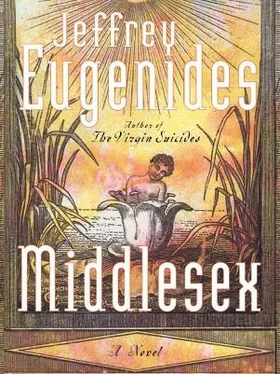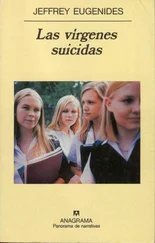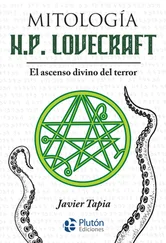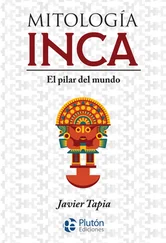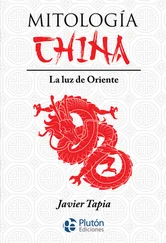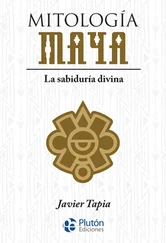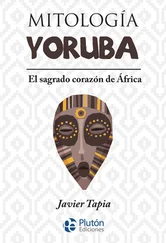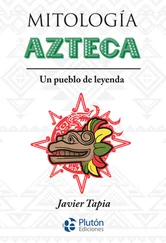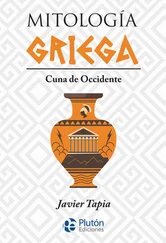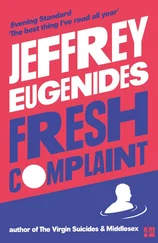From then on, I was her favorite. Midmornings she would relieve my mother by taking me up to the attic. Lefty had regained most of his strength by this time. Despite his speech paralysis, my grandfather remained a vital person. He got up early every day, bathed, shaved, and put on a necktie to translate Attic Greek for two hours before breakfast. He no longer had aspirations to publish his translations but did the work because he liked it and because it kept his mind sharp. In order to communicate with the rest of the family, he kept a little chalkboard with him at all times. He wrote messages in words and personal hieroglyphics. Aware that he and Desdemona were a burden to my parents, Lefty was extremely helpful around the house, doing repairs, assisting with the cleaning, running errands. Every afternoon he took his three-mile walk, no matter the weather, and returned cheerful, his smile full of gold fillings. At night he listened to his rebetika records in the attic and smoked his hookah pipe. Whenever Chapter Eleven asked what was in the pipe, Lefty wrote on his chalkboard, “Turkish mud.” My parents always believed it was an aromatic brand of tobacco. Where Lefty obtained the hash is anybody’s guess. Out on his walks, probably. He still had lots of Greek and Lebanese contacts in the city.
From ten to noon every day my grandparents took care of me. Desdemona fed me my bottles and changed my diapers. She finger-combed my hair. When I got fussy, Lefty carried me around the room. Since he couldn’t speak to me, he bounced me a lot and hummed to me, and touched his big, arching nose to my little, latent one. My grandfather was like a dignified, unpainted mime, and I was almost five before I realized that anything was wrong with him. When he tired of making faces, he carried me to the dormer window, where, together, from the opposite ends of life, we gazed down at our leafy neighborhood.
Soon I was walking. Animated by brightly wrapped presents, I scampered into the frames of my father’s home movies. On those first celluloid Christmases I look as overdressed as the Infanta. Starved for a daughter, Tessie went a little overboard in dressing me. Pink skirts, lace ruffles, Yuletide bows in my hair. I didn’t like the clothes, or the prickly Christmas tree, and am usually shown bursting dramatically into tears . . .
Or it might have been my father’s cinematography. Milton’s camera came equipped with a rack of merciless floodlights. The brightness of those films gives them the quality of Gestapo interrogations. Holding up our presents, we all cringe, as though caught with contraband. Aside from their blinding brightness, there was another odd thing about Milton’s home movies: like Hitchcock, he always appeared in them. The only way to check the amount of film left in the camera was by reading the counter inside the lens. In the middle of Christmas scenes or birthday parties there always came a moment when Milton’s eye would fill the screen. So that now, as I quickly try to sketch my early years, what comes back most clearly is just that: the brown orb of my father’s sleepy, bearish eye. A postmodern touch in our domestic cinema, pointing up artifice, calling attention to mechanics. (And bequeathing me my aesthetic.) Milton’s eye regarded us. It blinked. An eye as big as the Christ Pantocrator’s at church, it was better than any mosaic. It was a living eye, the cornea a little bloodshot, the eyelashes luxuriant, the skin underneath coffee-stained and pouchy. This eye would stare us down for as long as ten seconds. Finally the camera would pull away, still recording. We’d see the ceiling, the lighting fixture, the floor, and then us again: the Stephanides.
First of all, Lefty. Still dapper despite stroke damage, wearing a starched white shirt and glenplaid trousers, he writes on his chalkboard and holds it up: “ Christos Anesti .” Desdemona sits across from him, her dentures making her look like a snapping turtle. My mother, in this home movie marked “Easter ’62,” is two years from turning forty. The crow’s-feet around her eyes are another reason (aside from the floodlights) why she holds a hand over her face. In this gesture I see the emotional sympathy I’ve always felt with Tessie, the two of us never happier than when unobserved, people-watching. Behind her hand I can see the traces of the novel she stayed up reading the previous night. All the big words she had to look up in the dictionary crowd her tired head, waiting to show up in the letters she writes me today. Her hand is also a refusal, her only way of getting back at a husband who has begun to disappear on her. (Milton came home every night; he didn’t drink or womanize but, preoccupied with business worries, he began to leave a little more of himself at the diner each day, so that the man who returned to us seemed less and less present, a kind of robot who carved turkeys and filmed holidays but who wasn’t really there at all.) Finally, of course, my mother’s upraised hand is a kind of warning, too, a predecessor of the black box.
Chapter Eleven sprawls on the carpet, wolfing candy. Grandson of the two former silk farmers (with chalkboard and worry beads), he has never had to help in the cocoonery. He has never been to the Koza Han. Environment has already made its imprint on him. He has the tyrannical, self-absorbed look of American children . . .
And now two dogs come bounding into the frame. Rufus and Willis, our two boxers. Rufus sniffs my diaper and, with perfect comic timing, sits on me. He will later bite someone, and both dogs will be given away. My mother appears, shooing Rufus . . . and there I am again. I stand up and toddle toward the camera, smiling, trying out my wave . . .
I know this film well. “Easter ’62” was the home movie Dr. Luce talked my parents into giving him. This was the film he screened each year for his students at Cornell University Medical School. This was the thirty-five-second segment that, Luce insisted, proved out his theory that gender identity is established early on in life. This was the film Dr. Luce showed to me, to tell me who I was. And who was that? Look at the screen. My mother is handing me a baby doll. I take the baby and hug it to my chest. Putting a toy bottle to the baby’s lips, I offer it milk.
My early childhood passed, on film and otherwise. I was brought up as a girl and had no doubts about this. My mother bathed me and taught me how to clean myself. From everything that happened later, I would guess that these instructions in feminine hygiene were rudimentary at best. I don’t remember any direct allusions to my sexual apparatus. All was shrouded in a zone of privacy and fragility, where my mother never scrubbed me too hard. (Chapter Eleven’s apparatus was called a “pitzi.” But for what I had there was no word at all.) My father was even more squeamish. In the rare times he diapered me or gave me a bath, Milton studiously averted his eyes. “Did you wash her all over?” my mother would ask him, speaking obliquely as usual. “Not all over. That’s your department.”
It wouldn’t have mattered anyway. 5-alpha-reductase deficiency syndrome is a skillful counterfeiter. Until I reached puberty and androgens flooded my bloodstream, the ways in which I differed from other little girls were hard to detect. My pediatrician never noticed anything unusual. And by the time I was five Tessie had started taking me to Dr. Phil—Dr. Phil with his failing eyesight and his cursory examinations.
On January 8, 1967, I turned seven years old. 1967 marked the end of many things in Detroit, but among these was my father’s home movies. “Callie’s 7th B-Day” was the last of Milton’s Super 8s. The setting was our dining room, decorated with balloons. On my head sits the usual conical hat. Chapter Eleven, twelve years old, does not join the boys and girls at the table but instead stands back against the wall, drinking punch. The difference in our ages meant that my brother and I were never close growing up. When I was a baby Chapter Eleven was a kid, when I was a kid he was a teenager, and by the time I became a teenager he was an adult. At twelve, my brother liked nothing better than to cut golf balls in half to see what was inside. Usually, his vivisection of Wilsons and Spaldings revealed cores consisting of extremely tightly bundled rubber bands. But sometimes there were surprises. In fact, if you look very closely at my brother in this home movie, you will notice a strange thing: his face, arms, shirt, and pants are covered by thousands of tiny white dots.
Читать дальше
Конец ознакомительного отрывка
Купить книгу
